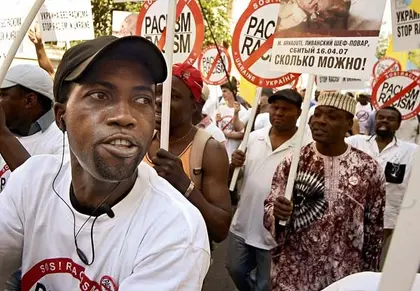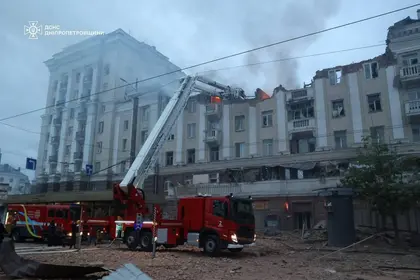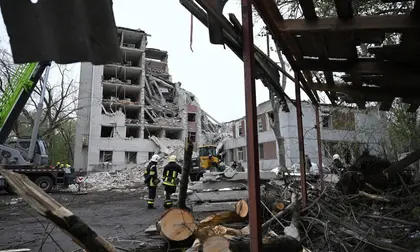Closer to home, a narrow range of stereotypes also follow a 7,000-member African community in Ukraine. Even for pragmatic Ukrainian businessmen, the continent doesn’t seem to be on their map. Bilateral trade with Africa topped only $3 billion in 2009 and investment ties are not particularly deep.
“China has long time ago realized importance of Africa,” said Sebele Mokoka, first secretary of the Embassy of South Africa in Ukraine. “Today Chinese are investing and integrating in every single area, establishing their strong presence throughout the continent.”
Ukrainian business groups, by contrast, are still investigating opportunities on the continent. From the other side, South Africa’s Pamodzi Investments plans to invest $1 billion in Ukraine’s Antonov airplanes, according to Bloomberg news service.
However, most headlines about Ukraine-Africa ties have been unflattering. The United Nations has singled out Ukraine as being a major arms supplier for Africa. “There are 54 firearms for every Ukrainian soldier … and a surplus of large planes,” Antonio Maria Costa, the director of the United Nations Office on Drugs and Crime, said on March 19, according to the Chinese state Xinhua news agency.
“Add low regulation and high economic security, and you get an environment where merchants of death can make millions,” Costa said.
In fact, the hijacking of one of the Ukrainian ships by Somali pirates in 2008 uncovered an illegal shipment of ammunition that was intended for South Sudan, not Kenya, as the export certificate said, Xinhua agency reported.
But, aside from the flaring of high-profile issues, Ukrainians don’t know much about Africa, surveys show. According to the recent poll conducted by the Kyiv-based East European Development Institute, this stereotype holds: All Africans are black and there are no mobile phones on the continent.
“Africa is facing dramatic changes, which most of Ukrainians are not aware of. Ukraine does not have its journalists in Africa and gets the image mostly through Western media, which often portrays only negative aspects of the continent,” said Mridula Ghosh of the East European Development Institute. “For most Ukrainians, Africa does remain this dark continent, a burden, land full of poverty, HIV/AIDS.”
The institute has been working with leaders of Ukraine’s African community in exposing Ukrainians to African culture through various activities, such as the celebration of Nelson Mandela’s birthday and an annual Africa Day.
For the Africa Day celebration, ambassadors of African countries will give lectures at Kyiv-Mohyla Academy three weeks in a row starting May 28.
Who they are
From northern African Arabic Muslims to Somali refugees, from students to exploited workers seeking asylum, many of the 7,000 Africans have more barriers to acceptance than in many other foreign communities.
The students are continuing an educational tradition started in Soviet times. The rest are former students who never left Ukraine. Some illegally immigrated; others were trafficking victims.
There are almost no officially registered African businesses in Ukraine. African studies are not present in most Ukrainian universities.
There are thriving mutual assistance groups within the local African community.
The head of the most populous Nigerian community in Ukraine, Johnson Aniki, spent the last three decades in Ukraine. Heaving earned a Ph.D. from one of the best economic universities in Ukraine, Aniki managed to do business even under Soviet communism.
“We would sell different foreign goods in Ukraine, including those from Africa and make good money during student years. Back then it was called speculation. Later is became business,” Aniki said. “It was such a great school of entrepreneurship.”
Right after the collapse of the Soviet Union, Aniki got involved in trading medical equipment and years later added wallpaper to his business.
Aniki said he hasn’t experienced big pitfalls, but others have.
“Some African students graduating from Ukrainian universities are embarrassed to return home,” said Issa Sadio Diallo, leader of the Guinean community. “They were persuaded by agents that Ukraine is a European country with employment possibilities for students. Some end up with no money for the flight home.”
Diallo is a former student who stayed in Ukraine to start a family and build a business. He says it has always been hard to “earn the trust of Ukrainian partners” right away because of his skin color.

Nigerian students celebrate the anniversary of national independence in Luhansk on Oct. 1, 2008. (Ukrinform)
Another issue many Africans contend with is harassment from law enforcement, including assaults and extortion.
“When something happens to an African he will not go to the police,” said Ghosh of the East European Development Institute.
Racism
African and many other foreign communities united in Ukraine to combat a number of racist attacks in 2007.
“During Soviet times we’d never experienced racism. [It was] completely hidden,” said Aniki, the head of Nigerian community. “Communism positioned itself as internationalism and society would deal harshly with anybody who tried to act differently.”
However, overt racism followed the collapse of the Soviet Union and, in recent years, Africans have organized to combat it.
“It really made us unite,” said Charles Asante-Yeboa, president of the African Center in Ukraine, which organized multiple rallies.
Currently, incidents of extreme racism are happening less frequently.
While many consider government statistics as unreliable, the Congress of National Communities in Ukraine, a non-profit organization, found that the number of racially motivated attacks dropped substantially last year. The association counted no racial murders and only 40 such incidents of violence, compared to a spike in 2006-2008, when 12 racially-motivated murders and 184 such attacks took place.
Much of the violence was directed against Africans, who remain cautious. They walk together, mostly in the daylight, careful to avoid gangs and bad neighborhoods. They carry their documents with them. They advise each other to be patient and polite at all times.
And, after intervening with high-ranking law enforcement officials, the police are responding positively, Aniki of Nigeria said.
“We have to give credit to Ukrainian law enforcement and the SBU [Security Service of Ukraine] as well. They really looked deep into the matter during the outbreak of racism and investigated the gangs. Africans were also in the working groups advising SBU.”
Ghosh from the East European Development Institute said that skinhead gangs and other extreme groups “changed their methods and now are infiltrating into fan clubs and political organizations, which is more dangerous in the long-term perspective.”
“At least we don’t have frequent open attacks and I don’t have to go to a funeral every month,” Ghosh said. “And through all the civic initiatives we do, we certainly cannot change attitudes and stereotypes about Africans that many people chose to have. We just don’t want Ukrainian minds to be poisoned with racism.”
Kyiv Post staff writer Nataliya Bugayova can be reached at [email protected].
Read also ”South Africa diplomat: My nation ‘has a lot to offer’ Ukrainians‘ , ‘Ambassador from Morocco: Need to bolster cooperation‘ and ‘Nigerian ambassador: Trade balance is in Ukraine’s favor‘ by the author.
You can also highlight the text and press Ctrl + Enter







Comments (0)